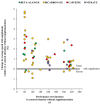Caffeine and Bicarbonate for Speed. A Meta-Analysis of Legal Supplements Potential for Improving Intense Endurance Exercise Performance
- PMID: 28536531
- PMCID: PMC5422435
- DOI: 10.3389/fphys.2017.00240
Caffeine and Bicarbonate for Speed. A Meta-Analysis of Legal Supplements Potential for Improving Intense Endurance Exercise Performance
Abstract
A 1% change in average speed is enough to affect medal rankings in intense Olympic endurance events lasting ~45 s to 8 min which for example includes 100 m swimming and 400 m running (~1 min), 1,500 m running and 4000 m track cycling (~4 min) and 2,000 m rowing (~6-8 min). To maximize the likelihood of winning, athletes utilizes legal supplements with or without scientifically documented beneficial effects on performance. Therefore, a continued systematic evidence based evaluation of the possible ergogenic effects is of high importance. A meta-analysis was conducted with a strict focus on closed-end performance tests in humans in the time domain from 45 s to 8 min. These test include time-trials or total work done in a given time. This selection criterion results in a high relevance for athletic performance. Only peer-reviewed placebo controlled studies were included. The often applied and potentially ergogenic supplements beta-alanine, bicarbonate, caffeine and nitrate were selected for analysis. Following a systematic search in Pubmed and SportsDiscuss combined with evaluation of cross references a total of 7 (beta-alanine), 25 (bicarbonate), 9 (caffeine), and 5 (nitrate) studies was included in the meta-analysis. For each study, performance was converted to an average speed (km/h) from which an effect size (ES; Cohens d with 95% confidence intervals) was calculated. A small effect and significant performance improvement relative to placebo was observed for caffeine (ES: 0.41 [0.15-0.68], P = 0.002) and bicarbonate (ES: 0.40 [0.27-0.54], P < 0.001). Trivial and non-significant effects on performance was observed for nitrate (ES: 0.19 [-0.03-0.40], P = 0.09) and beta-alanine (ES: 0.17 [-0.12-0.46], P = 0.24). Thus, caffeine's and bicarbonate's ergogenic effect is clearly documented for intense endurance performance. Importantly, for all supplements an individualized approach may improve the ergogenic effect on performance.
Keywords: cycling; ergogenic aids; intense exercise; performance; rowing; running; supplements; swimming.
Figures








References
Publication types
LinkOut - more resources
Full Text Sources
Other Literature Sources

